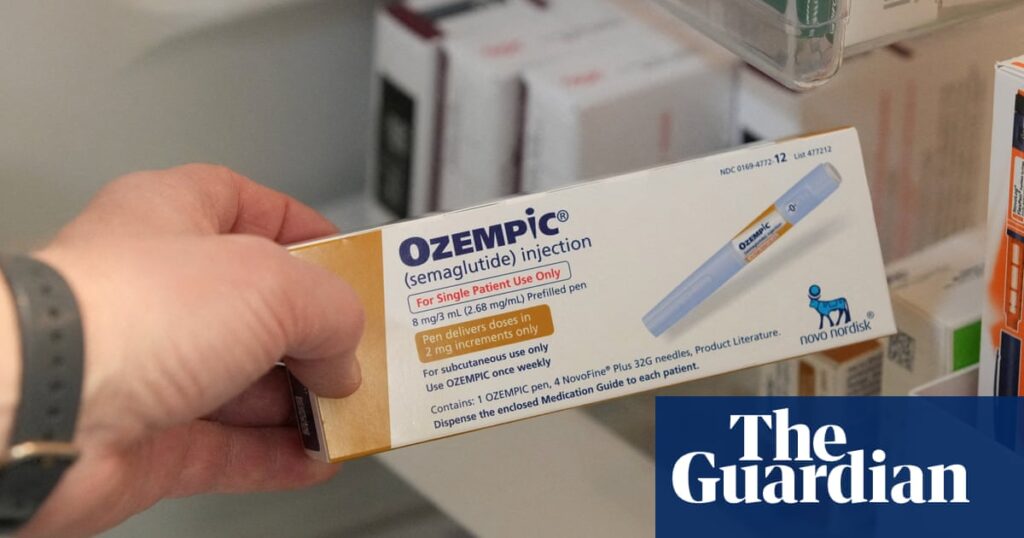The report says soaring healthcare costs and lost productivity from the global obesity crisis far outweigh the costs of new weight-loss drugs, and calls for governments to prioritise prevention by promoting healthy eating and exercise.
The report found that in the UK, Germany and the Netherlands, the annual cost of the diabetes drug Ozempic is lower than the extra medical care that obese people need, making there a clear economic case for these drugs. Research by ING Bank seen by the Guardian found that the cost of the weight-loss injectable Wegovy is higher, but still small compared with the overall economic cost of obesity to society.
Both drugs, made by Danish pharmaceutical company Novo Nordisk, are hugely popular, along with Eli Lilly’s Zepbound and Maunjaro. Administered as a weekly injection, they mimic a gut hormone called GLP-1, which makes you feel full and helps you lose weight. Recent studies have shown they may also have other health benefits.
Obesity rates have risen sharply over the past few decades, with more people in the world now overweight than malnourished. The new wave of GLP-1 drugs could help reverse this trend, but questions remain about how long their effects will last, and Wegovy, in particular, is expensive.
Obesity is associated with health problems such as cardiovascular disease, joint problems and diabetes, all of which are costly to treat.
ING healthcare analyst Diederik Stadig calculates that the overall cost of obesity in the UK is £100 billion a year, of which £19 billion goes to the NHS. This equates to healthcare costs of €1,700 (£1,400) per person per year, compared with €2,400 in Germany, €2,300 in the Netherlands and €2,500 in the US.
A year’s supply of Ozempic, which is also prescribed for weight loss, costs £830 in the UK and £2,760 for a year’s supply of Wegovy, compared to €1,100 in Germany and the Netherlands and €10,100 in the US. A year’s supply of Wegovy costs €3,500 in Germany, €3,200 in the Netherlands and €14,500 in the US, where drugs are generally more expensive.
The analysis is based on list price, which is often higher than the actual price paid.
Health care costs account for about a quarter of the total cost of obesity to society, Stadig said, which also includes lost economic productivity and personal expenses such as extra transportation, clothing and assisted living facilities for obese people.
“If the drug works in the long term, it will enable people to lead healthier lives, reduce lost productivity, reduce personal burden and improve quality of life. If we can prevent obesity in many people, it will not only reduce a lot of discomfort for people but also save society money,” he said.
A recent study conducted by the Institute for Advanced Studies in Vienna across 26 European countries found that obese people are up to twice as likely to miss work.
Skip Newsletter Promotions
Subscribe to Business Today
Get ready for work: All the business news and analysis you need every morning.
Privacy Notice: Our newsletter may contain information about charities, online advertising and externally funded content. For more information, please see our privacy policy. We use Google reCaptcha to protect our website and are subject to the Google Privacy Policy and Terms of Use.
After newsletter promotion
“Obesity can lead to more than 80 diseases, from depression to heart attacks,” said Thomas Cipionca, head of the institute’s Health Economics and Health Policy research group. “Obese people take more sick days. There are labour shortages across Europe, which is a major problem for the economy.”
He predicts that prices for obesity drugs will fall in the coming years as more drugs come on the market, but for now the government will have to prioritise those most at risk.
Stadig cautioned that the long-term effects of these drugs are uncertain. One study found that people who stopped taking semaglutide, the active ingredient in Ozempic and Wegovi, regained two-thirds of their body weight within a year. The drugs have side effects such as nausea and stomach pain, which lead many people to stop taking them after a while.
While doctors tend to prescribe weight-loss drugs in conjunction with diet and exercise plans, governments need to do more to tackle obesity, Stadig said. He suggested using VAT as a way to encourage healthier eating, with no or a low VAT on vegetables and a higher tax on fast food.



